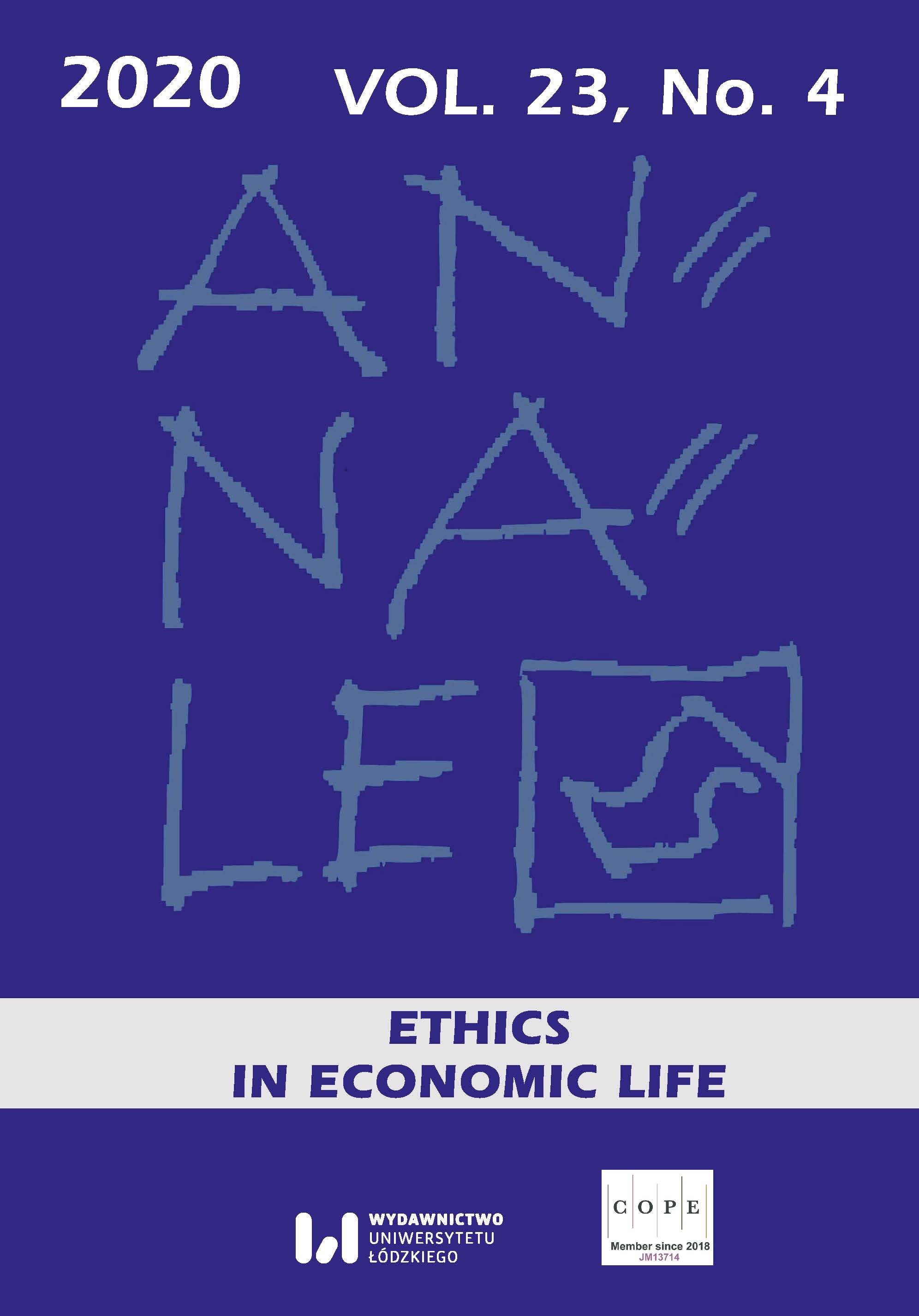Do investors care about CSR? Evidence from Polish public listed companies
DOI:
https://doi.org/10.18778/1899-2226.23.4.03Keywords:
social responsibility, risk, rate of return, beta coefficient, Treynor formula, Sharpe formulaAbstract
The CSR (corporate social responsibility) concept has become an increasingly important part of corporations’ strategies and plans. However, it does not have to translate into investors’ decisions to buy their shares. The article investigates the relationships between companies implementing a CSR strategy, the rates of return on their stocks, and their investment risk. The paper aims to verify whether applying a CSR strategy affects stock market parameters (lower risk, higher investment profitability) and whether investors consider CSR companies less risky or more profitable and reliable than non-CSR firms. The following hypotheses have been formulated: (I) CSR companies are less risky (in terms of investment risk) than non-CRS ones; (II) CSR companies are characterized by higher rates of return than non-CSR ones.
References
Bacon, C. (2009). Practical Portfolio Performance Measurement and Attribution. Chichester: John Wiley & Sons.
Google Scholar
Borowski, K. (2014). Miary efektywności zarządzania na rynkach finansowych [Measures of management efficiency on financial markets]. Warszawa: Difin.
Google Scholar
Buczkowski, B., Dorożyński, T., Kuna-Marszałek, A., Serwach, T. & Wieloch, J. (2016). Społeczna odpowiedzialność biznesu. Studia przypadków firm międzynarodowych [Corporate Social Responsibility. Case Studies of International Companies]. Łódź: Wydawnictwo Uniwersytetu Łódzkiego.
Google Scholar
DOI: https://doi.org/10.18778/8088-109-9.01
Cegliński, P. (2015). 5 lat funkcjonowania RESPECT Index. Ocena i perspektywy. In: Perspektywa – Wyzwania współczesnej gospodarki, Vol 1 (pp. 239–253). Toruń: Wydawnictwo Naukowe Uniwersytetu Mikołaja Kopernika.
Google Scholar
Długopolska-Mikonowicz, A., Przytuła, S. & Stehr, Ch. (2019). Corporate Social Responsibility in Poland: Strategies, Opportunities and Challenges. Springer International Publishing. https://dx.doi.org/10.1007/978-3-030-00440-8
Google Scholar
DOI: https://doi.org/10.1007/978-3-030-00440-8
Doś, A. (2019). Społeczna odpowiedzialność przedsiębiorstw z perspektywy ekonomii dobrobytu [Corporate Social Responsibility: the Perspective of Welfare Economics]. Annales. Ethics in Economic Life, 22(4), 21–36. http://dx.doi.org/10.18778/1899-2226.22.4.02
Google Scholar
DOI: https://doi.org/10.18778/1899-2226.22.4.02
Emerging markets. Looking to expand your investment horizon? The modern index strategy. (2019). New York: Morgan Stanley Capital International. https://www.msci.com/documents/1296102/1362201/MSCI-MIS-EM-Dec2018-Brochure.pdf/778681c7-09c8-9142-9f08-58aa16690e0e (accessed: January 15, 2020).
Google Scholar
Fisher, B., Turner, R. K. & Morling, P. (2009). Defining and Classifying Ecosystem Services for Decision Making. Ecological Economics, 68(3), 643–653. https://doi.org/10.1016/j.ecolecon.2008.09.014
Google Scholar
DOI: https://doi.org/10.1016/j.ecolecon.2008.09.014
ISO 26000: Social Responsibility. (2010). Geneva: ISO – International Organization for Standardization. https://www.iso.org/iso-26000-social-responsibility.html (accessed: July 30, 2020).
Google Scholar
Kotler, P. & Lee, N. (2004). Corporate Social Responsibility: Doing the Most Good for Your Company and Your Cause. Hoboken: John Wiley & Sons.
Google Scholar
Modigliani, F. & Modigliani, L. (1997). Risk-Adjusted Performance. The Journal of Portfolio Management, 23(2), 45‒54. https://doi.org/10.3905/jpm.23.2.45
Google Scholar
DOI: https://doi.org/10.3905/jpm.23.2.45
Moon, J. (2014). Corporate Social Responsibility: A Very Short Introduction. Oxford: Oxford University Press.
Google Scholar
DOI: https://doi.org/10.1093/actrade/9780199671816.001.0001
MSCI emerging markets index. (2019). New York: Morgan Stanley Capital International. https://www.msci.com/documents/10199/c0db0a48-01f2-4ba9-ad01-226fd5678111 (accessed: January 15, 2020).
Google Scholar
Rasche, A., Morsing, M. & Moon, J. (2019). Corporate Social Responsibility. Strategy, Communication, Governance. Cambridge: Cambridge University Press.
Google Scholar
Reclassification of Poland from advanced emerging to developed market status. Semi-Annual Index Review – September. (2018). London: FTSE Russell. https://www.ftse.com/products/downloads/FTSE_FAQ_Document_Poland.pdf (accessed: January 17, 2020).
Google Scholar
Stiglitz, J. E. (1999). Knowledge as a global public good. In: I. Kaul, I. Grunberg, M. A. Stern (Eds.), Global public goods: International cooperation in the 21st century (pp. 308‒325). New York: Oxford University Press.
Google Scholar
DOI: https://doi.org/10.1093/0195130529.003.0015
Tarczyński, W., Witkowska, D. & Kompa, K. (2013). Współczynnik beta. Teoria i praktyka [The Beta Coefficient. Theory and Practice]. Warszawa: Pielaszek Research.
Google Scholar
Treynor, J. (1965). How to Rate Management of Invested Funds. Harvard Business Review, 43(1), 63‒75.
Google Scholar
http://respectindex.pl/ (accessed: February 1, 2020)
Google Scholar
https://stooq.pl/ (accessed: February 5, 2020)
Google Scholar
https://www.bankier.pl/ (accessed: February 5, 2020)
Google Scholar
https://www.biznesradar.pl/ (accessed: February 5, 2020)
Google Scholar
https://www.gpw.pl/akcje (accessed: February 5, 2020)
Google Scholar
https://www.gpw.pl/aktualnosc?cmn_id=108700&title=GPW+uruchamia+indeks+WIG-ESG (accessed: February 1, 2020)
Google Scholar
Downloads
Published
How to Cite
Issue
Section
License

This work is licensed under a Creative Commons Attribution-NonCommercial-NoDerivatives 4.0 International License.









